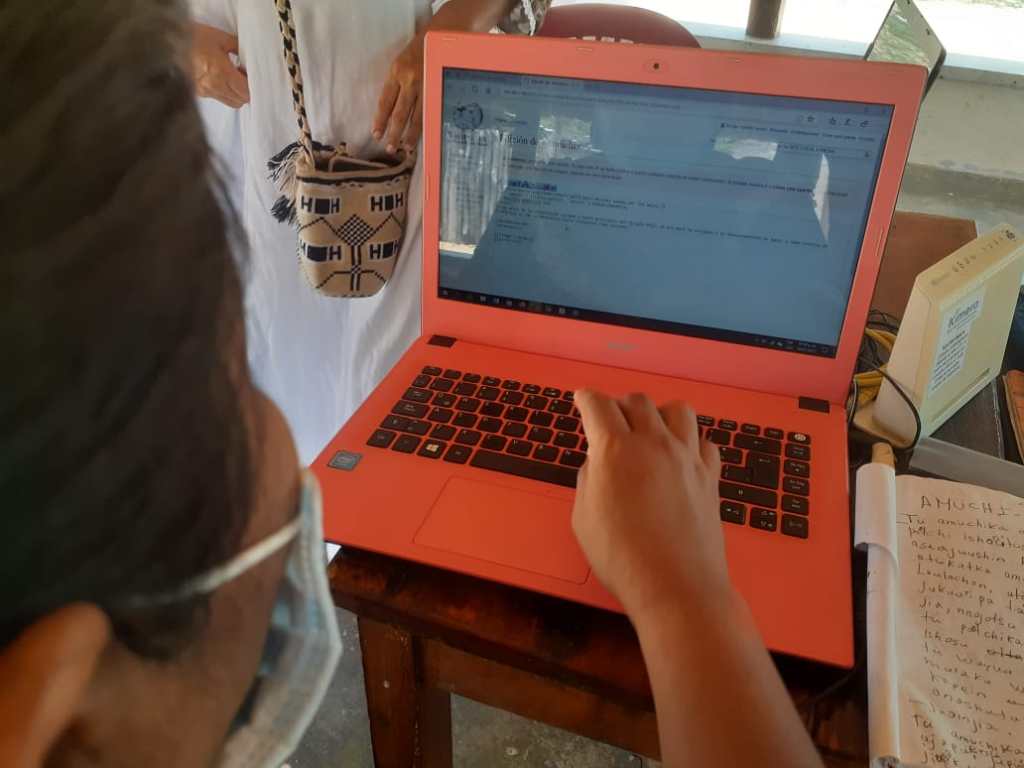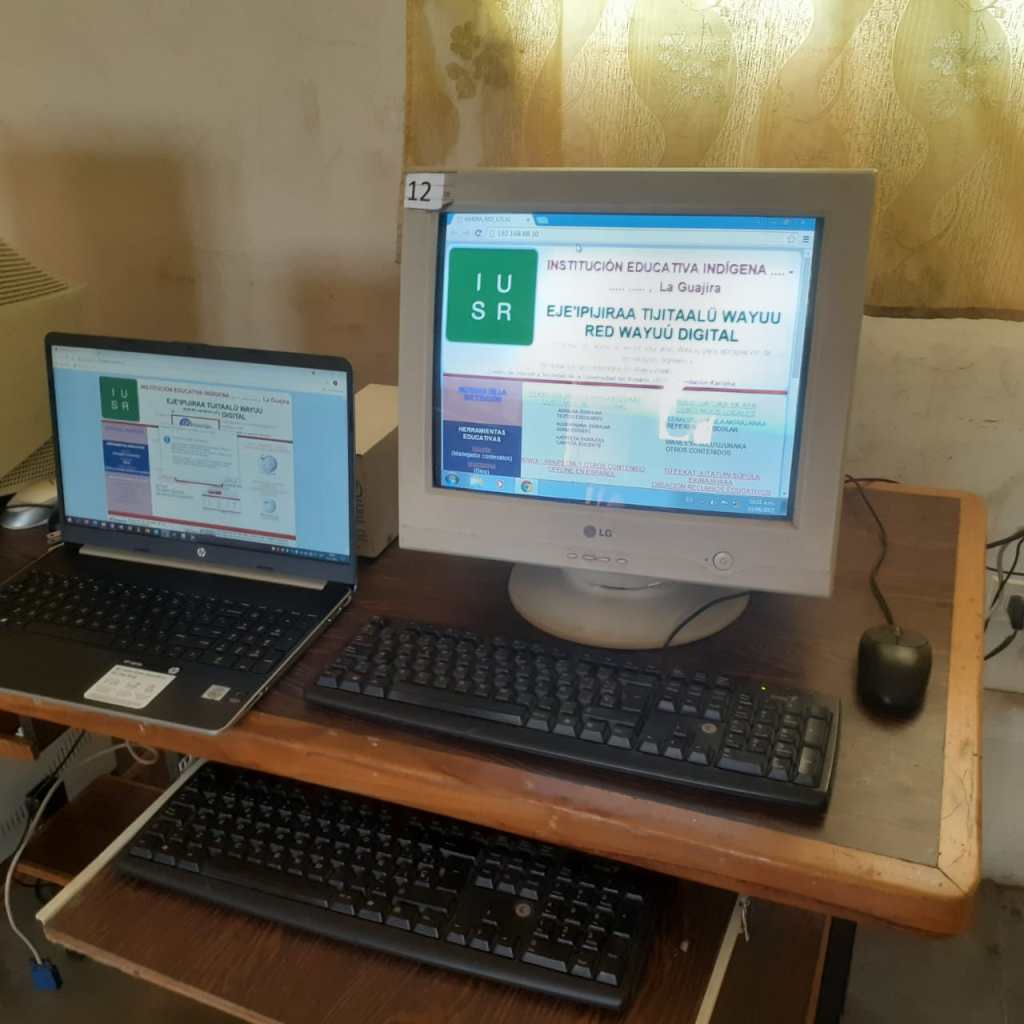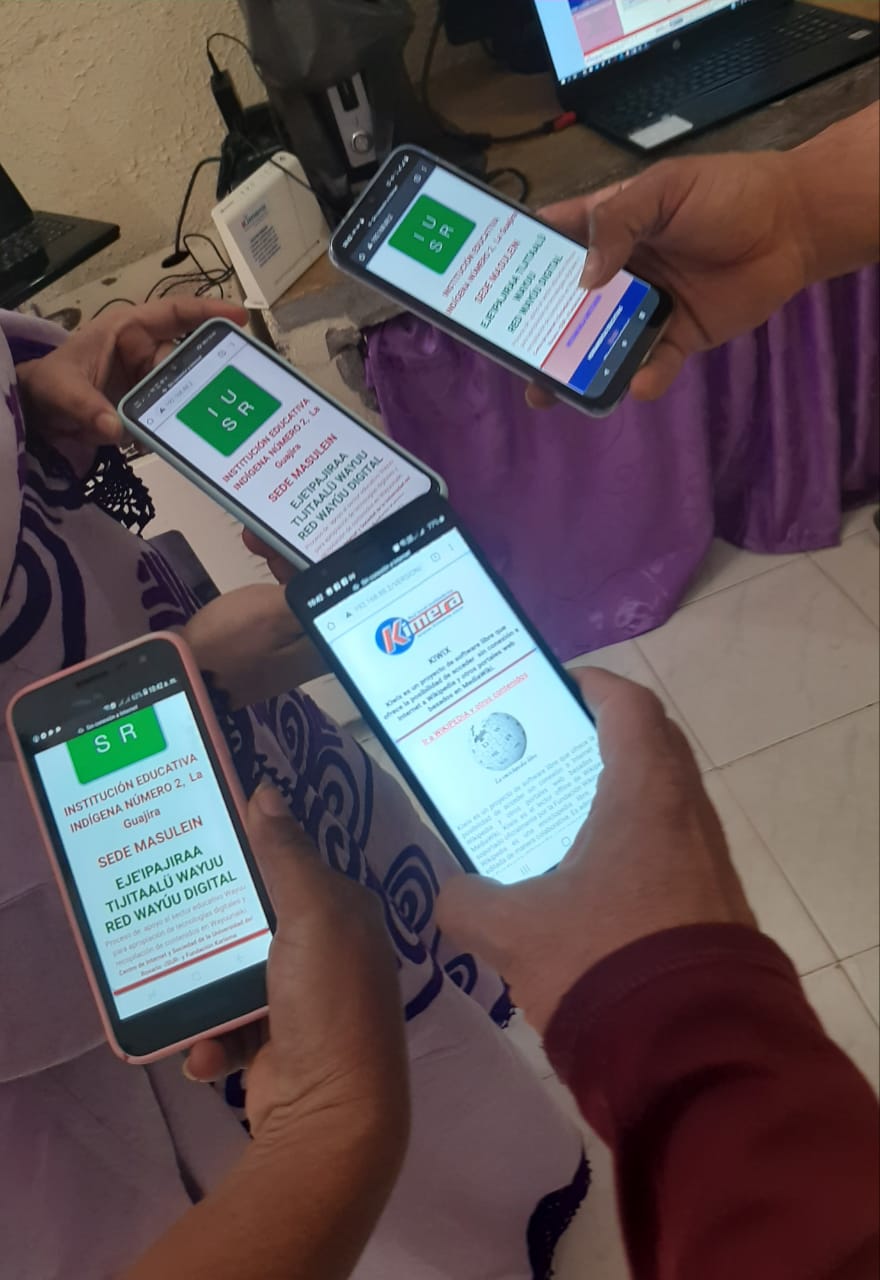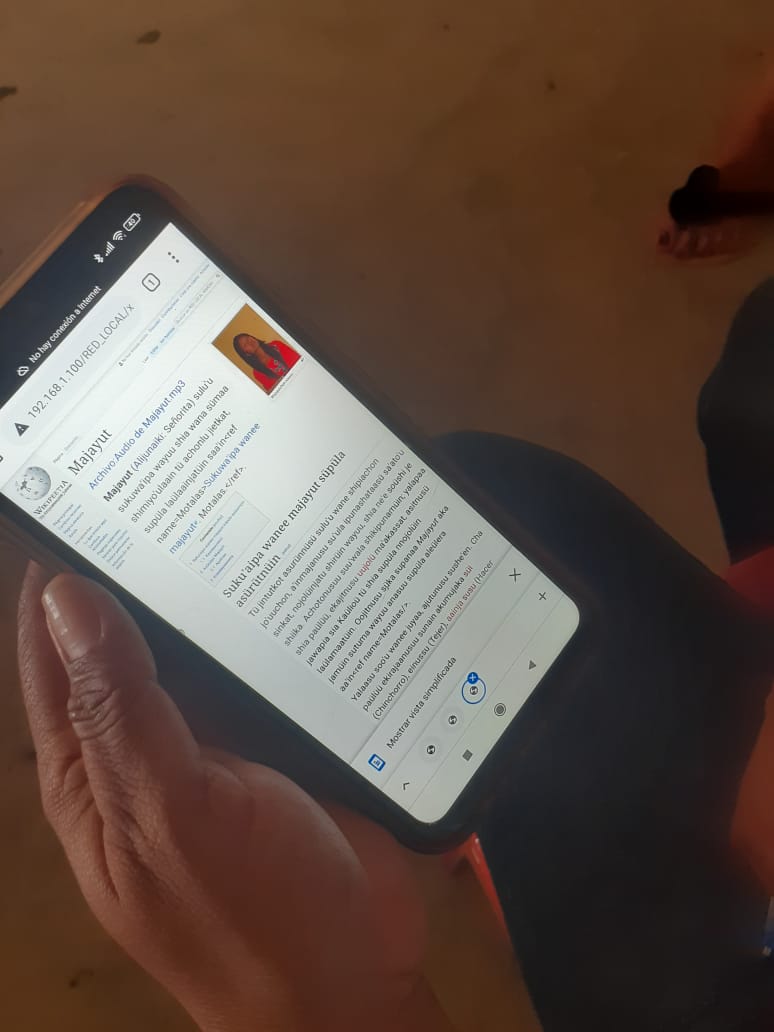The project “TIJITAALÜ WAYUU – WAYUÚ DIGITAL” seeks to support educational processes, carry out media and information literacy exercises, as well as develop and distribute open educational resources in educational centers of the Wayuú indigenous communities in Colombia and Venezuela, in the area of La Guajira.
Currently there are three areas in which we have been providing support and also building solutions together with teachers, directors and leaders of the Wayuú people, in relation to the use and appropriation of Wikimedia ecosystem projects. The areas of work in which we have been advancing are 1) Infrastructure, 2) Access to information and 3) Contributions to Wikimedia ecosystem projects.
The support in terms of infrastructure to the educational process in the framework of this project is given through the implementation and use of a local wireless network. Regarding access to information, through the Wayuu Digital Network we have been providing access to Wikimedia ecosystem projects, including Kiwix with Wikipedia in Spanish and other content in the .zim format. Additionally, we have a MediaWiki-based wiki that, in areas of limited internet access or total disconnection, allows us to bring, use and contribute content to Wikipeetia, the Wayuuanaiki version of Wikipedia.
The under-construction version of Wikipeetia in the Wikipedia incubator serves as a base and in turn complements this construction process. The activities around Wikipeetia have generated spaces and methodologies for contributions by teachers, directors, and Wayuú leaders to the projects of the Wikimedia movement and ecosystem, mainly to Wikipeetia.

Project Goals
Among the objectives set out in the project, there are two that are directly related to the Wikimedia ecosystem:
1) To ensure that teachers and students have access to the educational sites and can use Wikipedia in Spanish offline as an element that plays a very important role in supporting the educational process, and
2) That teachers and students can participate offline in the construction of Wikipeetia -Wikipedia in Wayuunaiki- in the educational centers as an exercise to support the educational process. Contributing to the use and revitalization of Wayuunaiki and the vindication of linguistic and cultural rights of the people in these contexts.
Context of Connectivity
Internet access conditions in the Wayuu context in Colombia and Venezuela are very diverse, however, since developing this project we have clearly learned that the indigenous communities we work with are located in areas where there is no connectivity, or very limited connectivity. In general, people depend on access through cell phones, devices that in turn have very limited coverage in rural areas. These connectivity circumstances are challenging, it’s a challenge to provide access to wikimedia ecosystem projects, which until now could only be used/visualized/improved with a stable Internet connection.

What is Intended
In the described context of little or no connectivity a local network, the EJE’IPAJIRAA TIJITAALÜ WAYUU – RED WAYÚU DIGITAL (based on La Red Local Kimera), installed in each educational site, allows us to provide support to the educational sites giving local access to a version of KIWIX with offline access to Wikipedia in Spanish and other options and contents that are in .zim format. The Local Network also provides access to educational resources and textbooks (including contents in Wayuunaiki) and some educational didactic tools.
To create the local network, equipment already available at the school or belonging to teachers is used as a server. Students’ cell phones are used as access devices. In contexts where there is no local network, any commercially available modem or router is used to create the network, even those already discarded with older ADSL technology.
Faced with the challenges of access and taking as a precedent the current situation of pandemic, where face-to-face presence has been limited, teachers need content to guide elementary and middle school students. This situation has led all actors in the education sector to look for options and opportunities in digital spaces, making both teachers and students more familiar with this format.
The version of MediaWiki installed on the local network facilitates the offline participation of teachers and students in the construction of an initial local version of Wikipeetia and at the same time, allows the advances in the editing process to be accessible to students and the community offline from any type of device with wireless access.

Use of MediaWiki in the Construction and Editing of Wikipeetia
The version of MediaWiki installed in the Wayuu digital Wayuu Network facilitates local access to the construction, editing, access and consultation of Wikipeetia. By incorporating MediaWiki in each local network, we have the option to create/simulate “local” versions of Wikipeetia in Wayuunaiki, facilitate and expand the number of editors of this, and eventually, think about bringing this experience to other indigenous languages.
In the case of Wikipeetia, the incubator project (which is only available online) was used to bring these contents to the local versions of MediaWiki of the Wayuu Digital Network. These local versions, which are different, are being complemented thanks to the contributions of the teachers participating in the project in the different educational centers. These local contributions will in turn be taken to the Incubator, and in this way the version in the incubator will be complemented.
It should be noted that the local versions in MediaWiki can be configured to provide additional options and opportunities in terms of content and content management. In addition to adjusting to the language in which you work, extensions have been installed that allow the inclusion of multimedia files (audio, image, video), editing with a visual editor, and a friendly interface with the end user. Regarding the inclusion of multimedia files, it is especially important in the case of indigenous languages, and particularly in the Wayuu communities, where orality and visuals are fundamental aspects within the cosmovision and culturally prevail over the textual.

Advances in the Contributions to Wikipeetia
Regarding the development of the work, from initial entries on MediaWiki we have led exercises where people have edited and added content adjusted to Wayuunaiki. In these exercises, the participants have prefered orality and showed appreciation for visuals. Additionally, in these local version the editing and citing rules are less strict which has led to a wide number of people interested in contributing.
We have foreseen that in order to fulfil the requirements, characteristics and formats to bring the articles and content created locally back to the Wikipeetia incubator and follow the rules around citation, relevance beyond the local contexts, encyclopedic relevance, specialized editors will be in charge of adjusting the articles and complex processes required.
Regarding how to move the articles among the different local networks to update them and bring them to Wikipeetia, the Wayuu Digital experience allows us to conclude that, within the limited connectivity allowed by WhatsApp and eventually with the implementation of physical means, the archives with the entries to the local network versions will be able to be transferred to the experienced editors so they can upload them to the incubator.
The people who have had access to the Local Network have been exploring and thinking about it based on their realities. We recently learned about a situation that occurred in the rural sector in Uribia, a municipality with limitations in terms of connectivity. One of the most experienced editors and translators of Wikipeetia, who makes contributions whenever his connectivity allows it. The editor installed the Wayuu Digital Network on his computer, and in an exploration of it, he found that he no longer depends on having connectivity to advance edits of Spanish Wikipedia and Wikipeetia entries, Mediawiki allows him to do this at any time.
Who We Are
Fundación Karisma is a civil society organization working to promote human rights in the digital world. The Innovation and Social Technologies Lab (Lab lTS) experiments primarily in small-scale contexts and local markets, under the framework of innovation and social technologies. It also prioritizes networking with organizations and individuals interested in different topics. Most of the current projects are being carried out in rural areas.
The Internet and Society Center of the Universidad del Rosario (ISUR) is an interdisciplinary space for research and training that works with a public interest and human rights perspective on issues related to the social challenges posed by technological changes. ISUR seeks to generate greater knowledge about the Internet and best practices by companies and States that promote respect for human rights, technological empowerment and the democratization of knowledge and information in Colombia and Latin America.

Can you help us translate this article?
In order for this article to reach as many people as possible we would like your help. Can you translate this article to get the message out?
Start translation